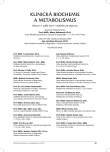-
Medical journals
- Career
Determination of albumin in serum and plasma. Harmonization of results and clinical recommendations in patients with renal diseases.
Authors: B. Friedecký 1,2; J. Kratochvíla 2
Authors‘ workplace: Ústav klinické biochemie a diagnostiky, Fakultní nemocnice Hradec Králové 1; SEKK s. r. o. Pardubice 2
Published in: Klin. Biochem. Metab., 25, 2017, No. 3, p. 108-111
Overview
Our presentation deals namely with degree of harmonization of results in serum/plasma albumin measurement. We describe differences between BCG and BCP methods and between serum and plasma. Data are concentrated mainly for using of albumin results in cases of chronic renal diseases including nutrition state these patients including haemodialysis, transplantation and end stage od renal disease. In this moment are present on the market usually two (BCG, BCP) or three (immunochemistry) routine method from majority of significant manufacturers. Nevertheless many studies from last 6 years show three basic drawbacks. Firstly, differences between methods, based on BCG method are very large (up to 13 g/L). Differences between methods based on BCP methods are significantly lower (cca 6 g/L). Secondly, results in serum are significantly higher, than in plasma and these results are higher in BCG method, than BCP method. Thirdly, uncertainty of albumin measurement is higher, than requirements of guidelines and recommendations for published renal diseases and main resource of these differences are systematic errors-precision of albumin measurements is low, in many cases under CV = 1.0 %.
Better harmonization level in albumin measurement should be achieved by better calibration (better traceability to ERM DA 470 k/IFCC) and by better selection of routine methods. It seems to be hopeful to prefer BCP method. There is also necessary to know and to apply that serum values are significantly higher than plasma values and this difference also depend on the used method and diagnostic kit.Keywords:
albumin, serum/plasma, harmonization, BCG, BCP, ERM DA 470k/IFCC.
Sources
1. Clinical Practice guidelines for nutrition in chronic renal failure. K/DOQI National Kidney Foundation. Am. J Kidney Dis., 2000, 35(Suppl 6), p. 5-140.
2. The renal network. Clinical performance goals 2012-2013. Přístupné na: http://www.therenalnetwork.org/qi/resources/trn-CPMgoals2012-2013e.pdf
3. National Kidney Foundation. KDOQI clinical practice guideline for hemodialysis adequacy. 2015 update. Am. J Kidney Dis., 2015, 66, p. 884-930.
4. Centers for Medicare and Medical Services. End stage renal disease (ESRD) 2016. Přístupné na: https://www.cms.gov
5. Yang, S. W., Choi, J. Y., Kwon, O. J. The impact of pretransplation serum albumin levels on long-term renal graft outcomes. Transplant. Proc., 2013, 45, p. 1379-1382.
6. JCTLM database: Laboratory medicine and in vitro dia-gnostics. Přístupné na: http://www.bipm.org/jctlm
7. Infusino, I., Braga, F., Valente, C., Panteghini, M. Commutability of the ERM-DA470k Reference Material for two assays measuring serum albumin using immunochemical principles. Clin. Chem. Lab. Med., 2011, 49/8, p. 1383-1384.
8. Weykamp, C., Secchiero, S., Plebani, M., Thelen, M., Cobbaert, C., Thomas A. et al. Analytical performance of 17 general chemistry analytes across countries and across manufacturers with INPUtS project of EQA organizers in Italy, the Netherlands, Portugal, United Kingdom and Spain. Clin. Chem. Lab. Med., 2017, 55/2, p. 203-211.
9. Infusino, I., Braga, F., Mozzi, R., Valente, C., Panteghini, M. Is the accuracy of serum albumin measurements suitable for clinical application of the test? Clin. Chim. Acta, 2011, 412, p. 791-792.
10. Infusino, I., Panteghini, M. Serum albumin: accuracy and clinical use. Clin. Chim. Acta., 2013, 419, p. 5-8.
11. Lo, S., Miller, G. W., Doumas, B. T. Laboratory performance in albumin and total protein measurement using a commutable specimen. Arch. Pathol. Lab. Med., 2013,137, p. 912-920.
12. CLSI, C 37-A: Preparation and validation of commutable human frozen serum pools as secondary reference materials for cholesterol measurement procedures. Wayne PA. 1999.
13. Van Houcke, S. K., Rustad, P., Stepman, H. C. M., Kristiansen, G. B. B., Stőckl, D., Roraas, T. H. et al. Calcium, magnesium, albumin and total protein measurement in serum as assessed with 20 fresh-single donation sera. Clin. Chem., 2012, 58/11, p. 1597-1603.
14. Koerbin, G., Tate, J. R., Ryan, J., Jones, G. R. D., Sikaris, K. A., Kanowski, D. et al. Bias assessment of general chemistry analytes using commutable samples. Clin Biochem Rev 2014,35 : 203-211.
15. Koerbin, G. Albumin. NSW Goverment/Health Patho-logy. Přístupné na: http://www.aacb.asn.au
16. Bachmann, L. M., Yu, M., Boyd, J. C., Bruns, D. E., Miller, G. W. State of harmonization of 24 serum albumin measurement procedures, and implications for medical decisions. Clin. Chem., 2017, 63/3, p. 770-779.
17. Kumar, D., Banerjee, D. Methods of albumin estimation in clinical biochemistry: Past, present, and future. Clin. Chim. Acta, 2017, 469, p. 150-160.
Labels
Clinical biochemistry Nuclear medicine Nutritive therapist
Article was published inClinical Biochemistry and Metabolism

2017 Issue 3-
All articles in this issue
- Congenital disorders of glycosylation: alpha-dystroglycanopathies
- „Normal“ laboratory finding
- Comparison of Measurement Free Light Chains by SPAPLUS and Immage 80
- Therapeutic monoclonal antibodies in clinical laboratory
- Determination of albumin in serum and plasma. Harmonization of results and clinical recommendations in patients with renal diseases.
- Clinical Biochemistry and Metabolism
- Journal archive
- Current issue
- Online only
- About the journal
Most read in this issue- „Normal“ laboratory finding
- Therapeutic monoclonal antibodies in clinical laboratory
- Congenital disorders of glycosylation: alpha-dystroglycanopathies
- Determination of albumin in serum and plasma. Harmonization of results and clinical recommendations in patients with renal diseases.
Login#ADS_BOTTOM_SCRIPTS#Forgotten passwordEnter the email address that you registered with. We will send you instructions on how to set a new password.
- Career

